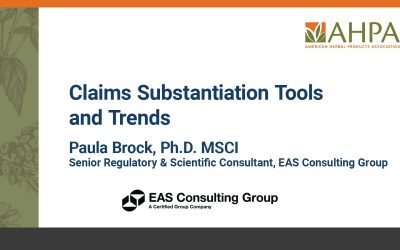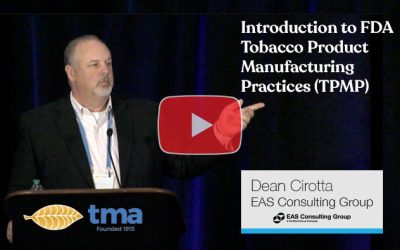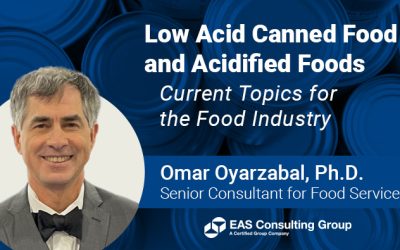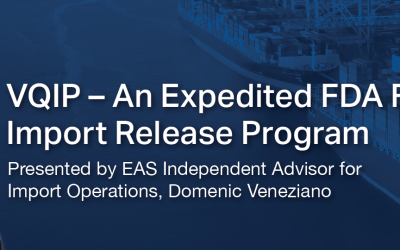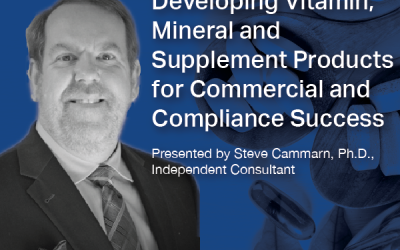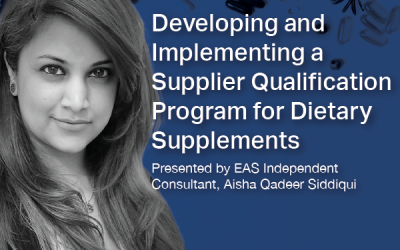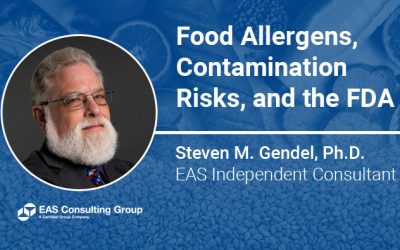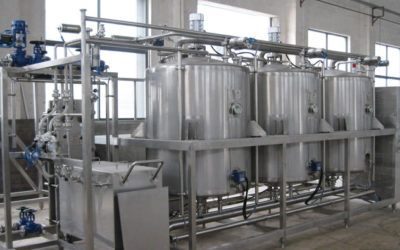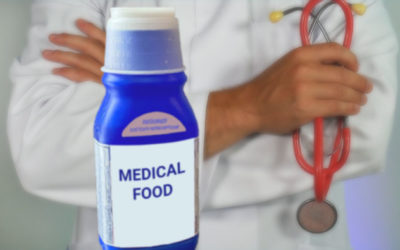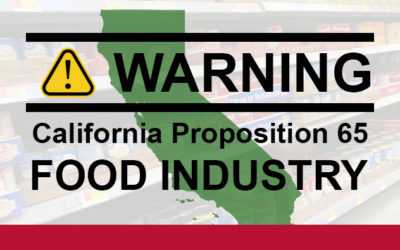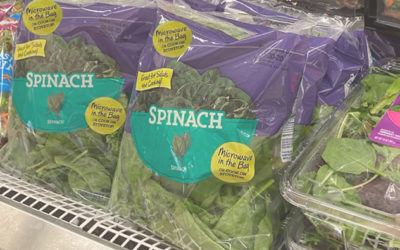Learn From Our Library of On-Demand Webinars
The detailed technical knowledge of EAS Senior Directors and Independent Consultants sets us apart from the competition and EAS frequently offers webinars in a public forum to provide a regulatory overview of hot topics that enable greater industry understanding. These public webinars are also available on-demand, here on the EAS website. We hope that you find them informative and welcome any questions or comments.
Raising Your Nutrition Label IQ
Many people have difficulty understanding the Nutrition Facts label, especially with regards to properly interpreting and using the information about serving sizes and the percent Daily Values. This webinar will clear up some of the confusion about these and other labeling issues. This webinar will also discuss some of the science that went into developing the Nutrition Facts label and explain why FDA decided to update and modernize the label in 2016. By attending this webinar, you will become a more knowledgeable label reader.
Dietary Component Specifications and Testing
Since the FDA’s dietary supplement cGMP regulations (21 CFR Part 111) were published, specifications and testing have been consistently one of the most frequently cited FDA observations. Specifically, industry continues to face challenges in complying with the specification and testing requirements for dietary supplement components.
Transforming Your Food Safety and Regulatory Compliance Programs with Artificial Intelligence
Simply put, Artificial Intelligence (AI) is the ability of a computer to perform tasks commonly associated with humans. In the area of food safety and food regulatory compliance, there are many tasks in which AI applications can be used, some more advanced than others.
Understanding the Role of Your U.S. Agent
Foreign entities who operate in US FDA-regulated industries must have an appointed FDA US agent before they can import products into the US. At a minimum these FDA US agents provide the most basic of required services. However, agents with relevant experience and knowledge can provide much more.
Health Canada
Interested in doing business of health products in Canada? This free webinar provides an overview of the Canadian regulation on natural health products and how EAS can assist companies with the diverse requirements of Health Canada.
21 CFR Part 11 and FDA Compliance
This webinar will help you understand in detail Computer System Validation (CSV) and how to apply the System Development Life Cycle (SDLC) Methodology
Good ANDA Submission Practices
Proactive Planning for the Best Possible OutcomesPresented by Radhika Rajagopalan, Ph.D., EAS Independent ConsultantFDA recent draft and final guidance documents related to generic drugs indicate the Agency’s thinking with regards to spurring competition with the aim of lowering the high cost of...
Claims Substantiation of Cosmetic Products
An EAS Consulting Group Complimentary On Demand WebinarPresented by Paula Brock, Ph.D., MCSISeptember 9, 2024 • 11:30 AM (Eastern) • Length: 45 minutesSubstantiation of product claims is required by law in the USA and this is not different for cosmetics. All types of claims need to be...
AHPA Claims Substantiation Tools and Trends
AHPA Claims Substantiation Tools and TrendsPresented by Paula Brock, Ph.D., MCSIThis is a portion of a webinar produced by the American Herbal Products Association (AHPA) originally held July 9, 2024.Enter Your Information to Watch NowBy clicking submit above, you consent to allow EAS Consulting...
Reassessment of EMPs
Reassessment of EMPs: Have You Identified the Correct Sampling Locations to Protect Your Product?An EAS Complimentary Webinar Presented by Rocelle Grabarek, EAS Independent ConsultantMarch 27, 2024 • 1pm (Eastern) 1.5 hoursMany of the environmental monitoring programs (EMP) have been established...
MoCRA: Facility Registration and Product Listing for Cosmetics
The Clock is Ticking: Are you Ready for Facility Registration and Product Listing under MoCRA?An EAS Complimentary Webinar Presented by John and Catherine Bailey, EAS Independent Consultants and Victoria Pankovich, Manager of Regulatory ServicesOctober 30, 2023 • 12pm (Eastern) 1 hourThe new...
Beverage Manufacturing
What’s Hot in the Beverage Industry? A look at trends and regulations for beverage manufacturingSeptember 12, 2023 at 1 p.m. EasternPresented by Omar Oyarzabal, Ph.D., EAS Consulting Group and Alex Brandt, Ph.D. Certified GroupThe beverage industry is thriving. From sports recovery to hydration,...
Review of the Foreign Supplier Verification Program’s Guidance for Industry
Review of Foreign Supplier Verification Program’s Guidance for IndustryAn EAS Complimentary WebinarPresented by Tim Lombardo, Senior Director for Food Consulting Services and Omar Oyarzabal, Ph.D., Senior ConsultantJune 22, 2023 11:00am (Eastern)The Food and Drug Administration has released the...
TMA 2023 Introduction to FDA Tobacco Product Manufacturing Practices
Introduction to FDA Tobacco Product Manufacturing PracticesDean Cirotta's presentation during the TMA 2023 Annual Meeting April 17-18, 2023 Leesburg, Virginia.
An Introduction to Proposed FDA Tobacco Product Manufacturing Practices (TPMPs)
An EAS Complimentary On Demand Webinar Presented by Dean Cirotta, EAS Consulting Group President and Shelly Blackwell, EAS Consulting Group Senior Director for Dietary Supplement and Tobacco Services.Long anticipated by the tobacco manufacturing industry, the FDA has proposed the establishment of...
An Introduction to Upcoming Modernization of Cosmetics Regulation Act (MoCRA)
An EAS Complimentary On Demand Webinar Presented by John and Catherine Bailey, EAS Independent Consultants. The Modernization of Cosmetics Regulation ACT (MoCRA) of 2022 was signed into law at the end of December 2022, and will start being implemented at the end of 2023. MoCRA adds significant new...
Low Acid Canned Food and Acidified Foods – Current Topics for the Food Industry
EAS Consulting Group and partner organization and testing laboratory, Certified Laboratories, are co-presenting a complimentary webinar that will review the basic regulatory requirements of low acid canned foods and acidified foods …
How the Voluntary Qualified Importer Program (VQIP) Can Expedite Your US Imports
Most exporters of food products to the US are plagued by FDA import bottlenecks at the border. From paperwork to random and for-cause inspections, importing often feels like a waiting game. For everyone who has thought, Wouldn’t it be nice if FDA product imports could be expedited, this EAS Consulting Group, a Certified Group company, webinar discusses FDA’s “fast track” program for food imports called the Voluntary Qualified Importer Program (VQIP).
Listeria monocytogenes in Ice Cream and Frozen Novelties
Ice cream is often associated with childhood, special occasions, and moments of pleasure with family and friends. Everyone has special ice cream memories! However, memories of eating ice cream should not be associated with illness, hospitalization, or death.
Dietary Supplement Product Development for Commercial and Compliance Success
Dietary supplement product development requires diligent product design, qualification and launch strategies that position your products ahead of the competition. Innovation is key in this high-stakes industry, as is staying in compliance with FDA expectations. This webinar offers tools for the...
Developing Dietary Supplement Specifications – No “By Input” Here
Regulatory expert Steve Cammarn, Ph.D., discusses specifications testing for dietary supplement finished products. Use of “By Input” to verify the strength of a dietary ingredient or to exempt a finished product from testing is never acceptable.
Developing and Implementing a Supplier Qualification Program for Dietary Supplements
In this webinar, regulatory expert and EAS Independent Consultant Aisha Siddiqui explains what you need to know when developing a component supplier qualification program for dietary supplements.
Food Allergens and the FDA
Food Allergens, Contamination Risks, and the FDARegulatory expert Steven Gendel discusses the many struggles of implementing an effective allergen control system. Nearly 20 years since the passage of the Food Allergen Labeling and Consumer Protection Act of 2004 (FALCPA), the misbranding of...
Assume Nothing: What You Think You Know About the Cannabis Industry May Not Be True
An EAS and Food Safety News Complimentary Webinar. Presented by Kathy Knutson, Ph.D., EAS Independent Consultant. The food industry is built on a history of Good Manufacturing Practices, Hazard Analysis and Critical Control Points (HACCP), and the Food Safety Modernization Act (FSMA) with its...
CTP’s Draft Guidance on Analytical Testing Methods Validation and Verification for Tobacco Products
What You Need to KnowPresented by Charlotte Peyton, EAS Independent Consultant. FDA’s December 2021 draft guidance on validation and verification testing methods used in analytical testing of tobacco products creates an opportunity and defined mechanism by which tobacco product manufacturers and...
Food Fraud Mitigations and Testing
EAS and Food Safety News Complimentary WebinarPresented by EAS Senior Directors,Tim Lombardo, Food Consulting Services andMaged Sharaf, Ph.D., Labeling, Cannabis and Claims Services. April 20, 2022, at 1pm easternFood Fraud is a global challenge, costing billions to the food industry and consumers...
U.S. FDA’s Latest Requirements for the 510(k)
Presented by John Lincoln, EAS Independent Consultant. The majority of medical devices are cleared for marketing in the U.S. by the FDA under the 510(k) process, others are exempt, and some must go through the extremely costly, time consuming and rigorous PMA approval process. The FDA holds...
The 12-Steps of Operational Efficiency
How Aligning of Operations and Quality Assurance Can Drive Down Costs While Improving Efficiency. Presented by Mike Hughes and Steve Cammarn, Ph.D., EAS Independent Consultants. Operations and Quality Assurance departments often operate in opposition. Their different goals lead to different...
Medical Device Product Risk Management
Presented by John Lincoln, EAS Independent Consultant. Both the U.S. FDA and the EU's MDR require product risk management as part of virtually all regulatory compliance efforts. Companies must be proactive in reducing product risk while increasing user benefits though many are still not developing...
Navigating the Process of Importing Food Products into the United States
Presented by EAS, Certified Laboratories and L&L Trade Law. Importers of food products intended for introduction into the U.S. interstate commerce are responsible for ensuring that the products are safe, sanitary, and labeled according to U.S. requirements. Importers can import foods into the...
How To Be an Effective and Sought After Expert Witness
As highly regulated industries are subject to more claims and litigations, and with growing agency challenges to ingredients, processes and branding, the target company’s regulatory compliance is often a key issue in presenting a successful defense. An expert witness’ opinion, report and testimony...
Food Safety – Of the Package By the Package and For the Package
Presented by EAS Independent Consultant, Thomas Dunn. Did you know the safety of your product begins and ends with packaging? Packaging is considered the “forgotten food ingredient” and has a myriad of US regulatory requirements including food contact substances, minimizing or preventing food...
Validación de limpieza CIP
Presentado por Bernardo Clavijo. Para dar cumplimiento a los requisitos legales y normativos vigentes, es importante realizar la validación de las medidas de control de la inocuidad, entre las cuales está la limpieza y desinfección de las superficies de contacto. ¿Qué significa esto para su...
Cleaning Validations – Your GMPs Depend on It
An EAS Premium Webinar Presented by Joe McGuinness, EAS Independent Consultant. For FDA to require that equipment be clean prior to use is nothing new, with the main rationale to prevent contamination or adulteration of drug products. Per FDA’s current Good Manufacturing Practices (cGMPs), the...
PMTA Deficiency Letter Readiness and Response Preparation
Part 2 of a special series focusing on CTP’s requirement of PMTA submissions With Willie J. McKinney, Ph.D., Scientific Advisor for Labstat and EAS Independent Consultant & Moderated by Michael Bond, President of Labstat International. You are anxiously waiting to hear from FDA about your...
Distilling FSMA – Alcohol Beverages and the FDA
A complimentary webinar presented by Charles Breen, Senior Advisor FSMA, EAS Consulting Group and John Messinger, Senior Attorney, Lehrman Beverage Law. The question of which federal government agency(s) regulate alcohol beverages should be easy to answer. But, because beverages are also...
Medical Device Manufacturing – A Look at FDA Enforcement Trends
EAS Complimentary Webinar Presented by George Calafactor, Ph.D., EAS Independent Consultant. A look at FY 2020 FDA observations for medical device manufacturers shows a clear focus on procedural integrity and quality systems. Good Manufacturing Practices for medical devices, as found in 21 CFR...
Medical Device or a Wellness Device?
Wellness devices are big business, creating an accountability partner for the user and providing real-time data to their medical provider. But where does a wellness device cross the line to a medical device and what does that mean for the manufacturer? From design, to claims to special
EPCRA SARA SDS RCRA An Alphabet Soup and Customer Notifications Post FDA Regulations
Ingredient suppliers have an alphabet soup of compliance requirements, beyond those of FDA. From EPA to OSHA to even DOT, all product ingredients are regulated depending on the hazards
Medical Foods – When Will the FDA Enforcement “Shoe” Drop?
The industry’s interest in Medical Foods is growing with many new products as well as the repositioning and relabeling of existing products that places them into the medical foods space. FDA’s oversight and enforcement effort focused on Medical Foods has been limited partly …
Safe Foods for Canadians – What you Need to Know
The Canadian Food Inspection Agency (CFIA) is responsible for the safety of food products sold in Canada by enforcing the recently implemented Safe Foods for Canadians Regulation (SFCR). It is a compilation of 14 sets of regulations governing safety of human …
US FDA Proposed Traceability Rule – Overview
FDA’s proposed rule “Requirements for Additional Traceability Records for Certain Foods” mandates traceability recordkeeping requirements for certain foods such as cheeses, shell eggs, some types of fish and produce. When finalized, the Traceability Regulation will be …
Preparing for a PMTA Pre-Approval Inspection
Presented by Tara Lin Couch, Ph.D., EAS Senior Director for Dietary Supplement and Tobacco Services The Family Smoking Prevention and Tobacco Control Act referred to as the Tobacco Control Act (TCA), signed into law on June 22 …
California Proposition 65 and the Food Industry
Proposition 65 is a statute that all companies selling products into California must comply with by providing warnings if their products contain certain chemicals that result in consumer exposure above a certain daily threshold. Failure to comply with the stringent requirements …
Hygiene Improvement, Monitoring & Tracking
While the “new norm” for food manufacturing hygienic practices is rapidly evolving, an intense focus on proactive assurance of food and employee safety is the top industry priority. With increased focus on hygienic practices comes an increased requirement to data …
Understanding and Mitigating Risks of Emerging Pathogens
The food industry has a history of testing for Enterobacteriaceae, coliforms and/or E. coli as indicator microorganisms. Since 2009 there were 40 outbreaks in the United States of pathogenic E. coli such as Shiga toxin-producing E. coli (STEC) associated with leafy greens…
Selecting and Submitting an ANDA Application
The FDA Generic Drug User Fees Amendment (GDUFA) has entered a relatively matured stage with applicants of Abbreviated New Drug Applications (ANDAs) experiencing a timely review and communications regarding their submissions packet, as well as increasing approval numbers. However, until …
Retail Food Safety in a Post-Pandemic World
The Retail Food Industry is finally beginning to see an opening as many areas of the country are experiencing decreasing cases of COVID-19, meaning businesses can begin to safely scale up. But what does that mean and how can the retail food industry ensure safe operations in this new normal? Do you understand …
Fast Tracking Antimicrobial Agents – FDA’s Accelerated Programs
Developers of antimicrobial agents may seek an accelerated FDA review of their products under the accelerated programs such as Fast Track Designation, Breakthrough Therapy Designation, Accelerated Approval, or Priority Review and gain additional 5 years of …
OSHA Lockout-Tagout – Critical Steps to Employee Safety
Is your manufacturing floor a safe work environment? Do you abide by OSHA controls commonly known as Lockout-Tagout? Employees can be seriously or fatally injured when machinery they clean, service or maintain unexpectedly energizes, starts up, or releases …
Cutting Edge Methods for Detecting Food Fraud
The challenge of detecting Food Fraud has never been greater nor the economic loss to food manufacturers, importers, retailers and consumers. In the recent past, we have had to rely on the integrity of the supply chain, person to person relationships and trained sensory
Tips to Streamlining the Drug Master File Process
The meticulous detail of a Type II Drug Master Files (DMF) enables FDA to review and assess the chemistry, manufacturing, stability, purity, impurity profile, packaging and Good Manufacturing Practices data of Active Pharmaceutical Ingredients (API) or a finished drug dosage form …
Codex Opportunities for Food Manufacturers
Can Codex food standards and various food safety, hygiene guidelines and codes of practice positively impact domestic food manufacturers that do not export? The short answer is “YES!” Codex provides a transparent international platform for food safety and hygiene as well as manufacturing practices, food …
Dietary Supplements and FSMA Compliance – Fallacy or Fact?
In 1994 the Dietary Supplement Health and Education Act (DSHEA) created a new, legal class of products, called “Dietary Supplements”, which are regulated by the FDA as a subcategory of foods. Since DHSEA, the Food Safety Modernization Act (FSMA) of 2011 was passed
Dietary Supplement GMP Enforcement – a Look at Recent FDA Observations and Warning Letters
Though FDA’s 21 CFR 111 GMPs for Dietary Supplements has been in place for over a decade, the industry continues to be plagued by the complexities of compliance…
Navigating CBP and Prior Notice of FDA’s Imported Products
As the pace of FDA regulated products increases, companies importing food, dietary supplements, food additives, food and dietary ingredients to the United States must keep pace with changing regulations intended to ensure the safety of U.S. consumer and integrity of the food-based products being imported. FDA has historically seen an import rate increase of 5-10% in the last decade and in 2018, 31% of those were food products requiring prior notice.
Understanding how to navigate the FDA and US Customs import process, including how to utilize their programs to expedite the review of paperwork and shipments at the US ports of entry will be …
FDA’s Transition from CFR 820 to the ISO 13485:2016 – Instituting a New Quality Management System (QMS)
FDA’s shift to a Quality System Regulation structure of ISO 13485:2016 is an effort to harmonize medical device regulations as well as reduce compliance and record keeping burdens faced by current medical device manufacturers. But will those …
Food Defense – Untangling the Challenges and Strengthening Opportunities
EAS Independent Advisor for FSMA, Charles Breen and Consultant Kathy Knutson, Ph.D. co-present a webinar on Food Defense. Food Defense is increasingly a worry for firms as our global business climate opens opportunities for intentional harm both domestically and overseas. The ability of food manufacturers …
Understanding GRAS Submissions and Avoiding Data Pitfalls- Meet FDA Requirements
Before a substance can be legally added to food in the U.S., with rare exceptions, it must be either an approved food additive or determined to be generally recognized as safe (GRAS) for use in food …
Preparing for FDA Inspections, a Look at Recent Observations and Trends
Foreign companies exporting FDA regulated products to the United States can at any time expect an FDA announcement of facility inspection. Looking at the complete safety package from record keeping and retention, to specifications and testing to …








